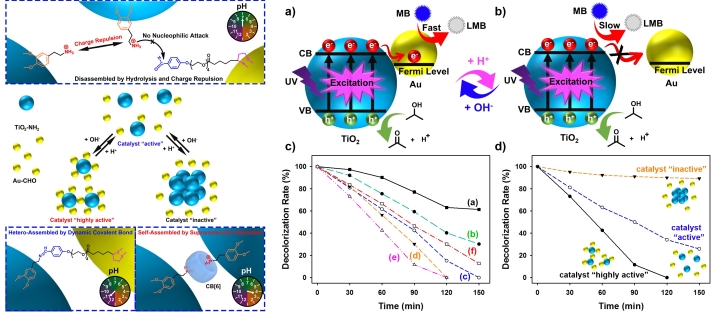Artificial switchable catalyst is a hot topic in the field of supramolecular chemistry and catalysis chemistry. Recently, Prof. Da-Hui Qu Group achieved remarkable advance in the nanoparticles-based switchable catalysts. A paper entitled “Dynamic Self-Assembly Encodes A Tri-stable Au–TiO2 Photocatalyst” was published in Advanced Materials (DOI: 10.1002/adma.201604948; http://onlinelibrary.wiley.com/doi/10.1002/adma.201604948/full).

Artificial switchable catalysts, whose catalytic activity could be switched in response to the external stimuli, have emerged as one of the most attractive themes in recent years due to the great research significance of the specific and automatic enzyme-catalyzed reactions in nature. In the previous work of the same group (Angew. Chem., Int. Ed. 2015, 54, 15789), they successfully performed the dual mode switched TiO2 NPs in tunable catalytic performances in photochemical reactions, which was located on controlling the accessible surface area by reversible aggregation/dispersion and proved to be effective for turning the “off/on” states of the catalytic activity. In this work, they further designed and fabricated a novel pH-encoded tristable Au@TiO2 photocatalysts system.The smart “sticky” groups immobilized on the surface of NPs render the pH responsibility to the NP system, hence bringing the programmed and switchable modulation of the NP catalyst system. Through a pH-controlled mode, the mixed Au@TiO2 NPs system could undertake a tristable dispersion state in aqueous solution: i) self-aggregated TiO2 NPs and freely dispersed Au NPs; ii) randomly dispersed TiO2 and Au NPs; iii) hetero-assembled Au@TiO2 complexes. Significantly, these three states bear remarkably different photocatalytic performances, as an integrated result of electron transfer efficiency between Au and TiO2 NPs controlled by dynamic covalent hetero-self-assembly and accessible surface area variation controlled by noncovalent self-assembly. This work was expected as a significant advancement for the multistable artificial switchable catalysts based on NPs system, providing a novel strategy and inspiration for the stimuli-responsive self-assembly-encoded catalyst materials.
This work was completed by the PhD student Qi Zhang. This work was mainly supported financially by the Programme of Introducing Talents of Discipline to Universities, major project of NSFC led by Prof. He TIAN, and the Innovation Program of Shanghai Municipal Education Commission led by Prof. Yi-Tao Long.




